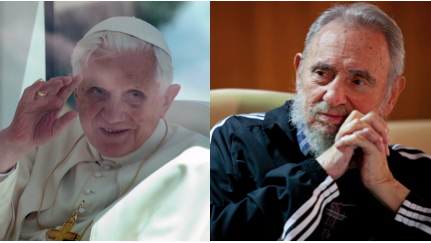
Pope Benedict XVI and Fidel Castro.
Pope Benedict XVI met fellow octogenarian and former Cuban President Fidel Castro for 30 minutes at the Papal Nuncio’s residence in Havana on Wednesday at the end of the Catholic leaders three-day visit to Cuba. The visit came after the Pope celebrated an open-air mass attended by more than 300,000 people, according to the Vatican, and in which he urged Cuban Catholics to search for “truth” and an “authentic freedom”.
But what did the now retired communist leader have to say to the leader of the Catholic Church? What did the Pope seek to achieve by visiting the island – and was everyone there glad to see him?
Excommunicated Castro asked to meet the Pope. Despite having been excommunicated in 1962, around the time Cuba went atheist, Fidel was keen to meet the Pope and in an article published on Cuba Debate, an official website of the Cuban government, said that he had “requested a few minutes of [the Pope's] very busy time”, noting that he would greet the Catholic leader as he had done his predecessor, Pope John Paul II in 1998. Castro’s request might not be as strange as it seems: As Reuters reminded, “Both of the Castro brothers were educated by Jesuits, the worldwide Catholic order.”
What did they talk about? Vatican spokesman Father Federico Lombardi said Benedict, 84, and Castro, 85, had an “exchange of ideas” in a ”very cordial” atmosphere. Philip Puella of Reuters reported that Castro told the Pope that he had watched his entire visit on television. They two “octogenarians joked about their age” and then Castro asked, “What does a pope do?” The Pope told him of his ministry, his trips, and his service to the Church. They also discussed the difficult world situation and the problems of mankind from a religious, scientific and cultural point of view. Fidel told the pontiff he was spending most of his time reading and reflecting on the state of the world and later asked the Pope to send him a book “to help him reflect”. The Pope is still thinking about which one to send, according to the Vatican.
A frail Fidel? Castro, though only a year older than the Pope, retired from government in 2008 due to poor health. The Reuters report included some telling details: Castro was helped out of his Mercedes by two assistants, walked slowly and was “wearing a scarf despite the searing heat outside.”
Masses flock to mass in Havana’s Revolution Plaza. The Pope’s open-air mass took place in the same plaza Castro “used to fill with big crowds and fiery revolutionary rhetoric in hours-long speeches”, Reuters reported, where “ten-story high images of Ernesto ‘Che’ Guevara and Camilo Cienfuegos” remain as testament to Cuba’s revolutionary history. The Pope addressed that history in his sermon: “The truth is a desire of the human person, the search for which always supposes the exercise of authentic freedom,” the Pope said, adding that some “wrongly interpret this search for the truth, leading them to irrationality and fanaticism; they close themselves in ‘their truth’ and try to impose it on others”. Reuters took this as “an apparent dig at Marxism”. The Pope also expressed his happiness that Cuba was beginning to allow the Church to express her faith openly and publicly, but encouraged the Cuban government to strengthen what had already been achieved.
“The pope is something big for Cubans. I come to hear his words, wise words for the Cuban people. That helps us. It gives us peace, it gives us unity,” Tourism worker Carlos Herrera, who came to the mass in Havana with his wife, told the Telegraph.
Dissidents detained? Meanwhile, Fiona Govan reported in the Telegraph that the Pope’s visit has “ignited criticism from opposition within Cuba itself with reports that hundreds of dissidents had been thrown in jail or placed under house arrest in the run up to Papal tour.” Carlos Alberto Montaner pointed out in the Miami Herald last week that for “the democratic opposition, the pope’s visit is a unique opportunity to make itself heard. For 48 hours, the world, through hundreds of journalists and all the important means of communication, will fix its eyes on Cuba.” Yoani Sanchez (@yoanisanchez), a blogger described in the Telegraph as “famed for her outspoken critiques of the communist regime”, tweeted from Havana on Wednesday: “There are many activists prevented from leaving their homes. Surrounded by political police… The arrests are intended to prevent activists and dissidents from entering the mass… While the people are coming into the Square for Mass #PapaCuba arrests increased night and early morning.”

